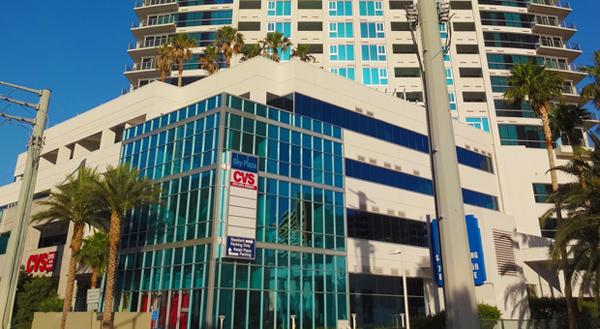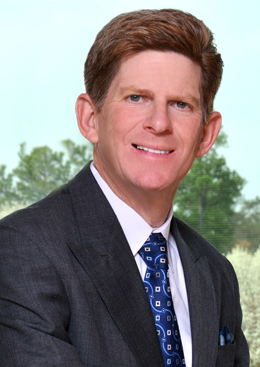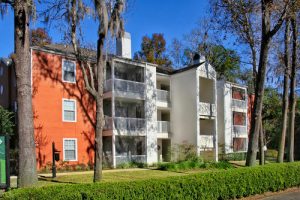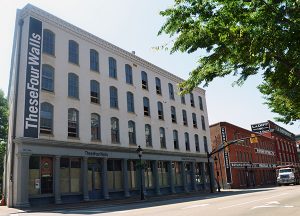
A recent acquisition for Capital Square Realty Advisors in Las Vegas. (Photo courtesy of Capital Square Realty Advisors.)
Louis Rogers never set out to buy a CVS pharmacy, and certainly not one in Las Vegas.
But the former Hirschler Fleischer attorney’s company inked a deal last week for its first pharmacy and convenience store at the edge of the Las Vegas Strip.
The 14,000-square-foot CVS, sitting blocks from the Wynn and Encore hotel resorts, is the eighth acquisition for Rogers’ Innsbrook-based Capital Square Realty Advisors. Its real estate portfolio has quickly grown to $100 million and includes an eclectic mix of apartments, medical offices, office buildings, a sporting goods store and a gym.
Capital Square hopes to do $150 million more in acquisitions for 2014. The firm is at about $42 million so far this year including in another seemingly random sector of real estate: trailer parks.
“There is not a pattern here,” said Rogers, the company’s chief executive.

Louis J. Rogers, founder and chief executive officer of Capital Square Realty Advisors. (Photo courtesy of Capital Square.)
There was a pattern — or at the very least a plan — when Rogers launched Capital Square roughly one year ago. Before that, he spent about 20 years in the real estate practice of Hirschler Fleischer. He also runs Rogers Realty Advisors, a Richmond-based investment banking firm for real estate deals.
Capital Square first set out after single-tenant, corporate headquarters properties occupied by companies with good credit and a long-term lease. It would then sell small chunks of individual properties to real estate investors through the 1031 exchange structure.
That was the model for the firm’s first acquisition in late 2012. Capital Square dropped $20 million for a 112,000-square-foot fully-leased office building that houses the headquarters of a Milwaukee-based two-hospital health system.
“They have to be in Milwaukee,” Rogers said. “Even if they wanted to go somewhere, there’s nowhere to go. The building was built for them.”
Then the plan changed in June 2013 when Capital Square closed its second deal, a 102-unit apartment complex in Tallahassee, Fla. Office buildings, it turns out, were too narrow a market.
“It was the market, it was the demographics and it wasn’t necessarily chased by the big REITs,” Yogi Singh, Capital Square’s vice president of acquisitions said of the move into apartments.
Capital Square hopped back into its office comfort zone for its next buy, scooping up an East Carolina University-leased medical office building in Greenville. N.C.
That’s where the pattern ends.
A 43,000-square-foot gym near Fort Worth, Texas followed; then a 45,000-square-foot Gander Mountain sporting goods store in Dothan, Ala.
“I don’t think any of us were sitting around and saying Gander Mountains are the next big deal,” Singh said about the company’s January 2014 purchase.
The firm is funding its buying spree using debt and equity, and has brought in a pair of unnamed investors to pitch in money to help the year-old firm take on projects it otherwise might not have the cash to swing.
Rogers received his bachelor’s degree from Northeastern University, and master’s and law degrees from Oxford University and University of Virginia School of Law, respectively.
Capital Square doesn’t keep an ownership stake in any of the varied properties for very long. It turns around and sells the properties in bits to 1031 exchange investors. The 1031 structure allows investors to buy into properties using proceeds from previously sold real estate and avoid capital gains taxes while making income from the new investment.
Rogers said typical exchange investors are between ages 55 and 65, have often actively managed real estate previously, are looking for a passive investment-grade property but may not have the capital to acquire a high quality piece of real estate on their own.
“They’re stuck,” Rogers said of investors. “They have $250,000, they call their Realtor and say, ‘What can you buy for 250?’ and they say, ‘You’ve got to be kidding me?’ ”
Minimum investments run at $25,000, though Rogers said it’s not uncommon for investors to buy in for seven-figure sums.
Investors get a check every month on their share of the property from the tenant’s rent payment. Capital Square makes its money on a buy-in fee it charges investors and an asset management fee typically paid by the tenant.
Capital Square runs its 1031 exchange business out of a well-appointed office on the second floor of Highwoods One in Innsbrook.
But 15 miles to the east, the company is hatching a second wing of its business in a Shockoe Bottom hideout of sorts.
The downtown outpost is a dimly lit acquisition “war room,” as Singh called it. The space could use a little work, but for now it makes a fitting spot for Capital Square’s local real estate redevelopment operations. Its first foray into that realm was the acquisition and renovation of the former These Four Walls furniture store at 1401 E. Cary St. in the Bottom.
Capital Square paid $1.99 million for the building in June 2012, four months after These Four Walls shut down. Since then, Capital
Square has repainted the building’s 14th and Cary street-facing facades, turned it into office space and moved in anchor tenant law firm Kaplan Voekler Cunningham & Frank and several smaller tenants.
It’s not stopping there.
Singh said they have another property under contract and are planning a similar conversion with an eye towards filling it with expanding tech-based companies. He would not give an exact location as the deal is still pending.
Capital Square is also expanding a third division within its business. Singh called it “manufactured housing communities.” Rogers called them trailer parks. Either way, Capital Square owns two of them, one in Georgia and another in Indiana.
They’ve moved into the trailer park game with a small group of “friends and family” investors, but Capital Square is looking into forming a more institutional platform for that class of property.
That potential wing of the business is still on the drawing board, and Capital Square doesn’t yet know if it would take the form of an exchange offering, a trailer park REIT or some other iteration. Once formalized, that arm on its own would look to do $100 million in trailer park acquisitions.
Just like the gym in Texas and the big sporting goods store in Alabama, Rogers and his firm are fueled by the idea that there are investors who will buy into trailer parks.
“Whatever is the best risk-adjusted return that week is the deal,” Rogers said.

A recent acquisition for Capital Square Realty Advisors in Las Vegas. (Photo courtesy of Capital Square Realty Advisors.)
Louis Rogers never set out to buy a CVS pharmacy, and certainly not one in Las Vegas.
But the former Hirschler Fleischer attorney’s company inked a deal last week for its first pharmacy and convenience store at the edge of the Las Vegas Strip.
The 14,000-square-foot CVS, sitting blocks from the Wynn and Encore hotel resorts, is the eighth acquisition for Rogers’ Innsbrook-based Capital Square Realty Advisors. Its real estate portfolio has quickly grown to $100 million and includes an eclectic mix of apartments, medical offices, office buildings, a sporting goods store and a gym.
Capital Square hopes to do $150 million more in acquisitions for 2014. The firm is at about $42 million so far this year including in another seemingly random sector of real estate: trailer parks.
“There is not a pattern here,” said Rogers, the company’s chief executive.

Louis J. Rogers, founder and chief executive officer of Capital Square Realty Advisors. (Photo courtesy of Capital Square.)
There was a pattern — or at the very least a plan — when Rogers launched Capital Square roughly one year ago. Before that, he spent about 20 years in the real estate practice of Hirschler Fleischer. He also runs Rogers Realty Advisors, a Richmond-based investment banking firm for real estate deals.
Capital Square first set out after single-tenant, corporate headquarters properties occupied by companies with good credit and a long-term lease. It would then sell small chunks of individual properties to real estate investors through the 1031 exchange structure.
That was the model for the firm’s first acquisition in late 2012. Capital Square dropped $20 million for a 112,000-square-foot fully-leased office building that houses the headquarters of a Milwaukee-based two-hospital health system.
“They have to be in Milwaukee,” Rogers said. “Even if they wanted to go somewhere, there’s nowhere to go. The building was built for them.”
Then the plan changed in June 2013 when Capital Square closed its second deal, a 102-unit apartment complex in Tallahassee, Fla. Office buildings, it turns out, were too narrow a market.
“It was the market, it was the demographics and it wasn’t necessarily chased by the big REITs,” Yogi Singh, Capital Square’s vice president of acquisitions said of the move into apartments.
Capital Square hopped back into its office comfort zone for its next buy, scooping up an East Carolina University-leased medical office building in Greenville. N.C.
That’s where the pattern ends.
A 43,000-square-foot gym near Fort Worth, Texas followed; then a 45,000-square-foot Gander Mountain sporting goods store in Dothan, Ala.
“I don’t think any of us were sitting around and saying Gander Mountains are the next big deal,” Singh said about the company’s January 2014 purchase.
The firm is funding its buying spree using debt and equity, and has brought in a pair of unnamed investors to pitch in money to help the year-old firm take on projects it otherwise might not have the cash to swing.
Rogers received his bachelor’s degree from Northeastern University, and master’s and law degrees from Oxford University and University of Virginia School of Law, respectively.
Capital Square doesn’t keep an ownership stake in any of the varied properties for very long. It turns around and sells the properties in bits to 1031 exchange investors. The 1031 structure allows investors to buy into properties using proceeds from previously sold real estate and avoid capital gains taxes while making income from the new investment.
Rogers said typical exchange investors are between ages 55 and 65, have often actively managed real estate previously, are looking for a passive investment-grade property but may not have the capital to acquire a high quality piece of real estate on their own.
“They’re stuck,” Rogers said of investors. “They have $250,000, they call their Realtor and say, ‘What can you buy for 250?’ and they say, ‘You’ve got to be kidding me?’ ”
Minimum investments run at $25,000, though Rogers said it’s not uncommon for investors to buy in for seven-figure sums.
Investors get a check every month on their share of the property from the tenant’s rent payment. Capital Square makes its money on a buy-in fee it charges investors and an asset management fee typically paid by the tenant.
Capital Square runs its 1031 exchange business out of a well-appointed office on the second floor of Highwoods One in Innsbrook.
But 15 miles to the east, the company is hatching a second wing of its business in a Shockoe Bottom hideout of sorts.
The downtown outpost is a dimly lit acquisition “war room,” as Singh called it. The space could use a little work, but for now it makes a fitting spot for Capital Square’s local real estate redevelopment operations. Its first foray into that realm was the acquisition and renovation of the former These Four Walls furniture store at 1401 E. Cary St. in the Bottom.
Capital Square paid $1.99 million for the building in June 2012, four months after These Four Walls shut down. Since then, Capital
Square has repainted the building’s 14th and Cary street-facing facades, turned it into office space and moved in anchor tenant law firm Kaplan Voekler Cunningham & Frank and several smaller tenants.
It’s not stopping there.
Singh said they have another property under contract and are planning a similar conversion with an eye towards filling it with expanding tech-based companies. He would not give an exact location as the deal is still pending.
Capital Square is also expanding a third division within its business. Singh called it “manufactured housing communities.” Rogers called them trailer parks. Either way, Capital Square owns two of them, one in Georgia and another in Indiana.
They’ve moved into the trailer park game with a small group of “friends and family” investors, but Capital Square is looking into forming a more institutional platform for that class of property.
That potential wing of the business is still on the drawing board, and Capital Square doesn’t yet know if it would take the form of an exchange offering, a trailer park REIT or some other iteration. Once formalized, that arm on its own would look to do $100 million in trailer park acquisitions.
Just like the gym in Texas and the big sporting goods store in Alabama, Rogers and his firm are fueled by the idea that there are investors who will buy into trailer parks.
“Whatever is the best risk-adjusted return that week is the deal,” Rogers said.




